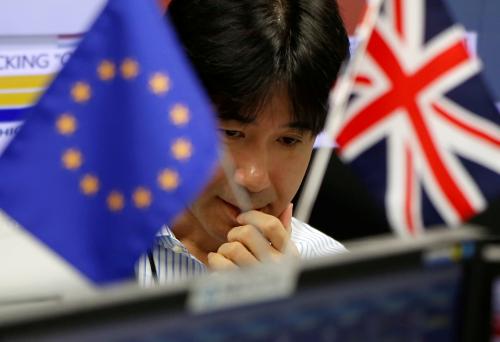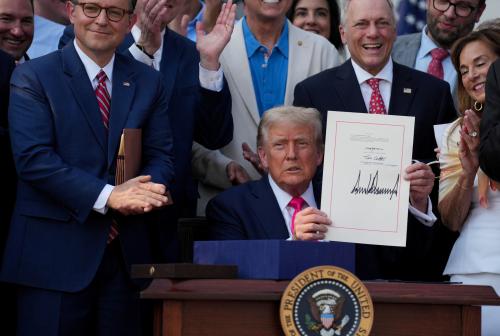And thus, it happened, Brexit is a reality. For the first time in history, a European Union member state has decided to leave the EU. And what a member state it is. The U.K. is the EU’s second-largest economy, its main military power (along with France), a country with a global foreign policy outlook, and a pro-active approach to international crises and challenges.
The composite coalition that championed Brexit, including the openly xenophobic U.K. Independence Party (UKIP) as well as staunch free marketeers from the Conservative Party, understandably celebrates a result probably unachievable just a few years ago. So do the other parties in Europe that have made opposition to immigration, European integration, and globalization the centerpiece of their political agenda, such as the National Front in France, the PVV in the Netherlands, and the Northern League in Italy. Rightly emphasizing the similarities with his views on these issues, the Republican contender for the U.S. presidency, Donald Trump, has hailed Brexit as a “good thing.”
The rest of the world—and of the U.K.—is stunned, as The New York Times headline read on the day after the U.K. referendum. Politicians, experts, and ordinary citizens wonder about the effects of Brexit for the U.K., Europe, and the world. These are legitimate concerns. To put it bluntly, Brexit is a severe blow to the U.K., to the EU, and to the international liberal order. Worse still, it might trigger a chain reaction that could turn it into a full-blown catastrophe.
A more divided country
In just one night, the U.K. has plunged into a grave constitutional crisis. The dramatic fall of the pound vis-à-vis the dollar—it reached its lowest point in 30 years—has caused the British gross domestic product to slip below France’s in two hours. It may be that the grim predictions of the U.K. Treasury—which has warned about a U.K. going into a recession already this year – are exaggerated. Yet there is little doubt that the next prime minister—David Cameron has already announced he will resign in the next few months—will have to cope with volatile markets and a more fragile and vulnerable economy. And this is going to be just one of the excruciatingly difficult tasks he or she will be confronted with.
The Conservative Party still holds an absolute majority in Parliament, so it is from its ranks that the next prime minister will come out. Pundits are betting on a leading figure of the pro-Brexit fraction, but that is not a given. The party is divided and bitter between its pro- and anti-Brexit camps, a wound that a centrist might perhaps have a better chance to heal.
Mending intra-party fences will just be the start, however. The EU referendum has torn apart the country. It has highlighted painful splits between the older generation (overwhelmingly in favor of Brexit) and the younger one (massively against); between the province and urban centers (London, Manchester, and Liverpool all voted to stay in the EU); and between English and Welsh (who voted for Brexit) and Northern Irish and Scots (who voted against).
Post-Brexit, the U.K. faces the prospects not only of a diminished international role and economy, but territory too.
This latter split is likely to have political consequences. The Scottish National Party, which unsuccessfully ran a pro-independence campaign in 2014, has announced that the possibility of holding a second referendum is on the table. And Sinn Fein, the Irish nationalist party, has called for a vote on Northern Ireland’s reunification with Ireland. Post-Brexit, the U.K. faces the prospects not only of a diminished international role and economy, but territory too.
A weaker EU
The EU will also suffer from Brexit. The leaders of the other 27 member states have to now decide how they want to handle the divorce with London. As the British economy is deeply integrated with the EU’s, imposing hard terms on the U.K.—for instance, excluding it altogether from the European single market—is counterproductive. At the same time, EU leaders want to prevent that too generous terms might invite emulations from other countries. Indeed, the risk of contagion has never been so high.
A fractured and divided EU would be a much less relevant international actor.
Next fall, Italy may find itself in a political crisis if voters reject a constitutional reform on whose success the pro-EU Prime Minister Matteo Renzi has pinned his political career. Mistrust of Italy’s ability to run the economy will spread across markets, raising the specter of yet another eurozone crisis. This will only give Euroskeptic movements more credibility. In spring 2017, the Netherlands and France will hold national elections, while German voters will go to the polls in early fall. Marine Le Pen and Geert Wilders, leaders of the National Front and the PVV respectively, are polling ahead of pro-EU forces. Both have both promised an EU referendum if elected. German Chancellor Angela Merkel is weary and might be unable to secure a fourth mandate. If she goes, the next chancellor is very likely to be less pro-EU and tougher on immigration. Europe’s re-nationalization would then be a real prospect.
A less cohesive West
A fractured and divided EU would be a much less relevant international actor. The Europeans’ influence on global governance, international institutions, and multilateral negotiations would shrink. The United States would see Europe as a problem rather than a partner, and the cohesion of the West, as much as its leadership capacity, would dwindle. The notion that rules, institutions, and norms should govern international relations would lose in credibility, while the one that emphasizes power would gain. The functionality of the Western-promoted liberal order would be at risk.
Well-respected experts have good reasons to argue that we should not despair about Brexit. They are right, the catastrophic scenario sketched above is not a given. Yet it’s not implausible either. Policymakers in the U.K., Europe, and elsewhere should consider their next steps being fully aware that Brexit’s effects might be felt farther away than the British Isles.
The Brookings Institution is committed to quality, independence, and impact.
We are supported by a diverse array of funders. In line with our values and policies, each Brookings publication represents the sole views of its author(s).








Commentary
Brexit ushers in a sea of troubles
June 28, 2016